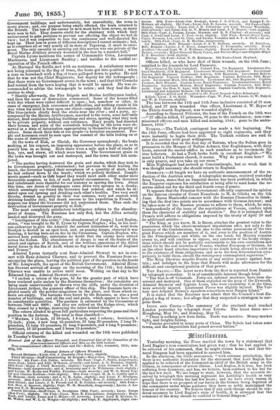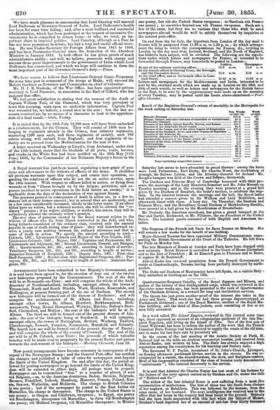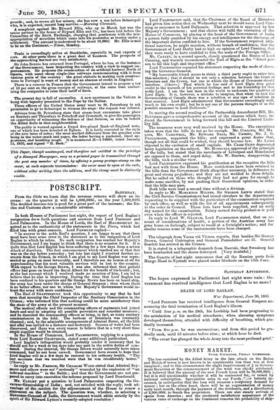Yesterday morning, the Times startled the town by a statement
that Lord Raglan's iron constitution had given way ; that he had applied to be relieved of his command, that he might return home ; and that Ge- neral Simpson had been appointed to succeed him.
In the afternoon, the Globe announced, "with extreme satisfaction, that there is no authentic foundation for the statement that Lord Raglan has applied to be relieved of the Command-in-chief of the British army in the Cnmea, in consequence of severe illness. Lord Raglan, it is true, has been suffering from dysentery, and has, we believe, been confined to his bed for the last few days. We are happy to state, however, that the accounts re- ceived by telegraph this morning represent his Lordship's health as very greatly improved within the last few hours; and we have every reason to hope that there is no prospect of our forces in the Crimea being deprived of the commander under whose guidance they have so nobly maintained the honour of the country. We believe that if any such change should be ren- dered necessary by Lord Raglan's state of health, it is arranged that the command of the army should be confided to General Simpson." We have much pleasure in announcing that Lord Canning will succeed Lord Dalliousie as Governor-General of India. Lord Dalhousie's health has been for some time failing ; and, after a most brilliant and successful administration, which has been prolonged at the request of successive Go- vernments he is compelled to return home-to take, we trust, an im- portant share in imperial politics. Lord Canning, although as a Peer he has not been prominent in debate, has had a long and useful official train- ing. He was Under-Seeretary for Foreign Affairs from 1841 to 1846, and has been Postmaster-General since the formation of the Aberdeen Ministry in January 1853. In both offices he has given proofs of much administrative ability ; and Will, we believe, proseoute with energy and success those great improvements in the government of India which Lord Dalhousie has commenced, and which we hope will continue to form the east important part of the Governor-General's duty.-Times.
We have reason to believe that Lieutenant-General Tames Fergusson tbr some time past in command of the troops at Malta, will succeed Sir Robert Gardiner as Governor and Commander-in-chief of Gibraltar.
Mr. H. J. R. Gaskoin, of the War Office has been appointed private secretary to Lord Panmoire, in succession to the Earl of Gifford, who has resigned that office. We feel great satisfaction in stating that the rumour of the death of Captain William Peel, of the Diamond, which was very prevalent in town this morning, rests upon no authentic information. Captain Peel wad wounded by, we believe, a round shot in the arm • but the last ac-. counts received are by no means of a character to lead to the apprehen- sion of a fatal result.-Globe, Friday.
It is stated that by the 12th July 12,200 men will have been embarked as a reinforcement, for the Crimea. They will consist of 1800 men be- longing to regiments already in the Crimea, four infantry regiments, mustering 1200 men each, and three regiments of cavalry, each 700 sabres strong, will embark from England ; and four regiments of in- fantry are to proceed. from the Mediterranean for the seat of war.
A letter received on Wednesday at Lloyd's, from Archangel, under date of the 13th instant, states that the blockade of all ports, roads, havens, and creeks in the White Sea had been notified on the 30th May (11th June) 1855, by the Commander of her Britannic Majesty's forces in the - said sea.
A Royal warrant has just been issued, regulating a new grant of pen- sions and allowances to the widows of officers of the Army. It abolishes all previous warrants upon this subject, and comes into operation, re- garding the relatives of officers who do not die on active service, upon the 15th instant. With respect to offieers killed in action, or dying from Wounds or from "illness brought on by the fatigue, privation, and ex- posure incident to active operations in the field before an enemy," it is applicable from the date of the declaration of war against Russia. The pensions granted in consequence of death in action are, in a few in- stances left at their former amount ; but in several they are moderately, and in a few cases considerably increased, chiefly in the lower ranks. If an officer killed have no widow, but a widowed mother, she will be allowed the "or- dinary" pension ; if no widow, children, or mother, but sisters, they will be collectively allowed the ordinary widow's pension. The new class of pensions created by the Royal warrant relates to the widows of officers who die from illtess contracted in the field, and who, being hitherto considered of the ordinary class, received only the amount payable in case of death during time of peace: they will henceforward re- ceive a yearly sum midway between the ordinary allowance and that in cases of death in action. We specify the amount according to rank- Colonels, 1501. Lieutenant-Colonels and Majors of the Foot Guards 145/. ;
Lieutenant-Colonels, 1401.; Majors, 1001.; Captains and Paymasters, 651.; Lieutenants Mid Adjutants, 501.; Second Lieutenants, Cornets, and Ensigns, 401. Quartermasters, 401., 501., and 651., according to length of service ; Veterinary Surgeons, 501., 551., and 701., according to length of service ; Inspector-Generals of Hospitals, 1501.; Deputy ditto, 1401.: First. class Staff-Surgeons, 100!.; Second-class ditto Regimental Surgeons, 651.; Pur- veyors, 401., 501., and 651., according to length of service; Assistant-Sur- geons, 501.
Arrangements have been submitted to her Majesty's Government, and it is said have been agreed to, for the erection of four out of the twelve new bishoprics proposed by the Commissioners. The seat of the first will be at Newcastle-on-Tyne ; and will comprise the whole of the Arch- deaconry of Northumberland, including, amongst others, the towns of Tynemonth, North and South Shields, 'Wark, Hexhami Knaresdale, and Bedlington, at present fbrming part of the see of Durham. The second new bishopric will be formed out of the diocese of Rochester; and will comprise the archdeaconries of St. Albans and Essex, including, amongst other towns, St. Albans, Hertford, Berkhampstead, Rick- mansworth, Tring, Hemel Hempstead, Welwyn, Hitchin, Bishop's Stort- ford, Chelmsford, and Malden; the seat of the bishopric will be at St. Albans. The third see will be formed out of the present diocese of Lin- coln; the seat of the bishopric being at Southwell. It will comprise, amongst others, the towns of Nottingham, Retford, Worksop, Tuxford, Clareborough, Newark, Farndon, Normanton, Mansfield, and Grimsby. The fourth new see will be formed out of the present diocese of Exeter; and will comprise the whole of the county of Cornwall. The seat of the see will be at St. Columb, near Truro ; the proceeds of which valuable benefice will be made over in perpetuity by the present Rector and patron towards the endowment of the bishopric.--Morning Chronicle, June 29.
New postal arrangements have become necessary in consequence of the repeal of the Newspaper Stamp ; and the General Post-office has notified the changes and published a table of rates for newspapers sent beyond the limits of the United Kingdom. On and after this day, the period al- lowed for posting newspapers to go beyond the limits of the United King- dom will be extended to fifteen days. All postage must be prepaid. Newspapers can be transmitted " free " to a number of places, if sent Titst Belgium,-as, to the Austrian dominions, Baden, Bavaria, Belgrade, Bremen, Frankfort, Lubeck, Hamburg, Hanover, Prussia, Poland, Rus- sia, Saxony, Wallachia, and Moldavia. The charge to British Colonies is one penny ; but if the newspaper be posted to the East Indies via Marseilles, the charge is threepence. The charge to the United States is one penny ; to Oregon and California, twopence ; to Egypt, one penny via Southampton, threepence via Marseilles ; to Java via Southampton one penny, via Holland twopence, via Marseilles threepence ; to Mexico one penny, but via the United States twopence ; to Sardinia via France one penny ; to countries beyond sea via France twopence. Such are a few of the rates, but they are so various that those who wish to send newspapers abroad Would do Well to satisfy themselves by inquiries at the nearest post-office.
On and from the lat July, the departure from London of the day mail to France will be postponed from 11.30 a. l. to 1.30p. m.; by which arrange- ment the delay to which the correspondence for France, &c., arriving in London by the day mail from Ireland,. Scotland, and the North of England, has hitherto been subject, will be obviated. The following are the regula- tions under which letters and newspapers for France, or intended to be forwarded through France, may henceforth be posted in London-
Letters. Newspapers At any of the ordinary receiving-offices 11.0 a. tn. 11.0 a. no At the branch offices in Charing Cross, the Dimes* and Old Cavendish Street 11.0 a. tn.
11.0 a. m
At the chief office, and at the branch office in Loon- bard Street 11.45 O. as. 11.15 ani Letters and newspapers for the Mediterranean and India, intended to be sent by the overland mails which are made up in London on the 10th and 26th of' each month, as well as letters and newspapers for the British forces in the East, to be sent by the supplementary mail made up on the morning of every Tuesday, may be posted until the hours above-mentioned.-Tost- °fee Circular.
Result of the Registrar-General's return of mortality in the Metropolis for the week ending on Saturday last.
Ten Weeks of 1845-'54. Week of 1855.
Zymotic Diseases
215.8 .... 247
Dropsy, Cancer, and other diseases of uncertain or varhible mon.
41.2 .... 38
Tubercular Diseases
158.3
221 Diseases of the Brain. spinal Man.:1r, Nerves, and Senses 119.7
125 Diseases of the Helmand Blood-vessels 35.3
43 Diseases of the Lungs, and of the other Organs of Respiration 187.4
188
Diseases of the Stomach, Liver, and other Organs of Digestion ,
61.5
MI Diseases of the Kidneys, Sc. 12.6 .... 14 Childbirth, diseases of the Uterus, Sc. 7.3
11 Rheumatism, diseases of the Bones, Johns, Ike. 7.3 •••• 12 Diseases of the Skin, Cellular Tissue, 5*. 1.5 •••• 4 Malformations. 3.1
5 Premature Birth 31.3
21 Atrophy 24.2
34
Age
31 Sadden ?171 .... 17 Violenee,PrIvatioa, Cold, and Intemperance SSA a.••
as
Total (including unspecified causes)
-
1,075 923.3
Saturday last seems to have abounded in grand dinners: among the hosts. wereLord Palmerston, Earl Derby, Sir Charles Wood, the Archbishop of Armagh, Sir Bulwer Lytton, and the Attorney-General for Ireland: Mr. Keogh's banquet was held at the Crown and Selptre, Greenwich.
The Duchess and Princess Mary of Cambridge honoured with their pre- sence the marriage of the Lady Henrietta Somerset and Mr. John Morant on Tuesday morning ; and in the evening they were present at a grand hall given by the Duchess of Beaufort, the bride's mother, to celebrate the nup- tials. In the interval between the marriage and the ball, the Royal ladies had attended a concert given by Sir William and Lady Middleton, and afterwards dined with them. A busy day. On Thursday, the Duchess and Princess Mary, and the Hereditary Grand Duchess of Mecklenburg Streit; were present at a ball given by the Marchioness of Breadalbane.
Mr. Peabody, the American merchant, has given a grand banquet at the- Star and Garter, Richmond, to Mr. Fillmore, the ex-President of the United States. The hundred guests consisted of both English and American no- tables.
The Empress of the French left Paris for Eaux Bonnes on Monday. She will remain a few weeks for the benefit of sea-bathing.
Major-General Torrens has been appointed Military Commissioner repre- sentingthe British Government at the Court of the Tuileries. He left town for Paris on Monday last.
The late Ministers of Russia at London and Paris have been charged with new missions. Baron Brunow is accredited to the Court of Hesse-Darmstadt and to the Diet of Frankfort ; M. de Kiaseleff goes to Florence and to Rome, to replace M. de Boutenieff.
Abd-el-Kader has received permission from the French Government to reside at Constantinople, Broussa hating been partially destroyed by earth- quakes.
The Duke and Duchess of Montpensier have left Spain, on a visit to Italy they embarked at Carthagena on the 15th.
Quartermaster-Sergeant Conolly, of the Royal Sappers and Miners, and author of the history of that distinguished corps, which was reviewed in the Spectator some weeks ago, has been promoted to the rank of Quartermaster of the Chatham division, as a reward for long and meritorious services.
The Queen has just given another proof of the interest she takes in the- Army and Navy. This week she has had three groups daguerreotyped at Portsmouth Dockyard ; one of the Royal Marines, another of the Royal Ma- rine Artillery, and the third of Blue-jackets, each consisting of five or six men fully accoutred.
In a work called The Island Empire, reviewed in this journal some time ago, there appeared an account of an octogenarian gardener of the late Em- peror Napoleon, still living on the island of Elba. One of the first acts of Count Walewski has been to inform the author of the work that the French Consul at Porto Ferrajo had been directed to supply the wants of the old man, and to make his last days easy by pecuniary aid.
In the course of the last meeting of the Asiatic Society at Paris, M. Reinand laid on the table an Arabian manuscript treatise, just received from Abd-el-Rader, and written by him. The Emir has always enjoyed a high reputation among his countrymen for his learning and literary taste.
The Reverend W. F. Taylor, incumbent of St. John's Church, Liverpool, on Sunday afternoon performed Divine service in the streets. Ile was ac- companied by a curate, the churchwardens, the clerk, and Scripture readers. Most of his congregation consisted of the class of females truly denominated "unfortunate " ; who listened decorously to the service.
It is said that Admiral Sir Charles Napier has lost most of his fortune by the failure of the navy agency carried.= by Strahan and Co. under the title of "Belford and Co."
The widow of the late Admiral Boxer is now suffering from a most dire accumulation of misfortunes. The first of these was the death from cholera of her nephew, at Balaklava. This was followed by the decease, from the same cause, of her husband. The next intelligence she received was to the effect that her house in the country had been burnt to the ground. Scarcely had she been made acquainted with this fact when the failure of Messrs- Strahan's bank deprived her of an amount of not less than thirty thousand pounds ; and, to crown all her misery, she has now a son before Sebastopol' who, it is expected, cannot long survive.--.1forning Chronicle. A complaint against Mr. Edward Ellis, who up to March last was the senior partner in the house of Edyard Ellis and Co., has been laid before the Committee of the Stock Exchange, charging that gentleman with the mis- appropriation of securities which came into his possession as trustee under a settlement The amount is understood to be about 16,000/. Mr. Ellis is said to be on the Continent. —Times, Monday.
Trade is exceedingly active at Stockholm, especially in vast exports of corn. At other ports there is a great deal of business. The prospects of the approaching harvest are very satisfactory. Sir John Rennie has returned from Portugal, where he has, at the instance of the Government, been inspecting the country with a view to suggest im- provements. He proposes the construction of an artificial harbour North of Oporto, with some cheap single-line railways communicating with it from various parts of the country : the great obstacle to making such construc- tions in Portugal is want of money and an absenoe of credit in England. There is a rumour in France that the Government intend to propose a tax of 10 per cent on the gross receipts of railways, at the same time author. king the companies to raise their tariff of fares.
The present day is full of anomalies. A new apartment in the Vatican is hung with tapestry presented to the Pope by the Sultan.
Three officers of the United States army went to St. Petersburg to ask permission to go to Sebastopol to witness the siege: the request was refused. Advicee from St. Petersburg state that steam-boat excursions take place on Sundays and Thursdays to Peterhoff and Cronetadt, to give the passengers an opportunity of witnessing the defence of that fortress, as also to behold the Allied fleets in that neighbourhOod.
The public is warned against a forged five-pOund Bank-of-England note, one of which has been detected at Egham. It is fairly executed in the style of the new issue of notes; the most marked difference from the genuine note being in the water-mark and paper, the latter having a puckered, lined ap- pearance, and handling rough. It is numbered II—I 94055, dated January It, 1855, and signed "H. Back."




































 Previous page
Previous page